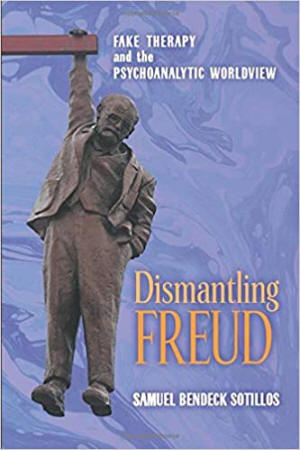Catholic Medical Quarterly Volume 70(3) August 2020
Book Review
Dismantling Freud: Fake Therapy and the
Psychoanalytic Worldview
by Samuel Bendeck Sotillos, Angelico Press
Reviewed by Pravin Thevasathan
 Prior
to the sixties, there was a concerted campaign at synthesizing the
Catholic worldview with Freudian dogma in some Catholic circles. Among
Catholic psychiatrists and psychologists, this attempt can be explained by
the lack of treatment options available at the time, apart from talking
therapies and long-term confinement. Needless to say, the attempt at
synthesis proved a failure. As the author of this excellent work
demonstrates in detail, Freudian dogma and any kind of belief in a
transcendent order are incompatible. He also quotes Freud as being quite
open about his own view:
Prior
to the sixties, there was a concerted campaign at synthesizing the
Catholic worldview with Freudian dogma in some Catholic circles. Among
Catholic psychiatrists and psychologists, this attempt can be explained by
the lack of treatment options available at the time, apart from talking
therapies and long-term confinement. Needless to say, the attempt at
synthesis proved a failure. As the author of this excellent work
demonstrates in detail, Freudian dogma and any kind of belief in a
transcendent order are incompatible. He also quotes Freud as being quite
open about his own view:
"Psychoanalytic research is...the subject of suspicious attention from Catholicism. I do not maintain that the suspicion is unmerited. If our research leads us to a result that reduces religion to the status of a neurosis of mankind and explains its grandiose powers in the same way as we should a neurotic obsession in our individual patients, then we may be sure we shall incur...the greatest resentment of the powers that be."
As the author demonstrates, Freud was not interested in objective scientific research: he was too engrossed in attempting to sort out his own neuroses, something he was not successful at. Freudian therapy became his own means of dealing with his hostility to religion. Indeed, what he was actually proposing was replacing religion with Freudian secularism. Ernest Jones, his most famous biographer, referred to Freud as the pope of a new sect, with his writings acting as sacred texts whose dogmas had to be believed. Heretics had to be expelled from the Freudian church, as Carl Jung was to find out. This even though Jung had made an act of faith while still a disciple: "Great is the power of your truth and it shall prevail."
Was this attempt at replacing religion a scientific endeavor or was something sinister going on? The author cites Velikovsky, a psychoanalyst who in 1941 said that Freud had made a Faustian pact in order to secure his own advancement. In order to do this Freud was willing to sell his soul to the Catholic Church, or the devil. For Freud, God, the Catholic Church and the devil are all one and the same, all father substitutes. As therapist, Freud was the father substitute:
"All my life I have had to play the devil in order that others would be able to build the most beautiful cathedrals with the materials that I provided."
Freud thus saw himself as God the Father and the devil. His religion seems much more like Gnosticism than any other religion.
Sotillos argues that Freud was not interested in the human being lying on his couch, trying to make sense of the ontological void brought about by modernism and its consequent spiritual crisis. He was too busy psychoanalyzing himself. The doctrine of the talking cure thus becomes not a science at all but a symptom of Freud's own psychological imbalance. Psychoanalysis is thus an inverted psychology, an inverted spirituality for modern man. In the words of Rene Guenon:
" While nineteenth century materialism closed the mind of man to what is above him...twentieth century psychology opened to what is below him."
There are some slight reservations I have about this work: it is implied that all modern psychology and psychiatry are fake religions that seek to destroy true religion. But surely problems arise only when these fields make the claim that they are replacing religion. The claims of contemporary British psychiatry are modest: most clinicians have little interest in dealing with the ontological void. Or, perhaps, the damage has already been done. Freud may have achieved some of his goals, but it is also increasingly clear that the ontological void of modern man is beyond the reach of his therapy.
Some reservations aside, this is a masterful and devastating critique of the doctrines of Freud.
